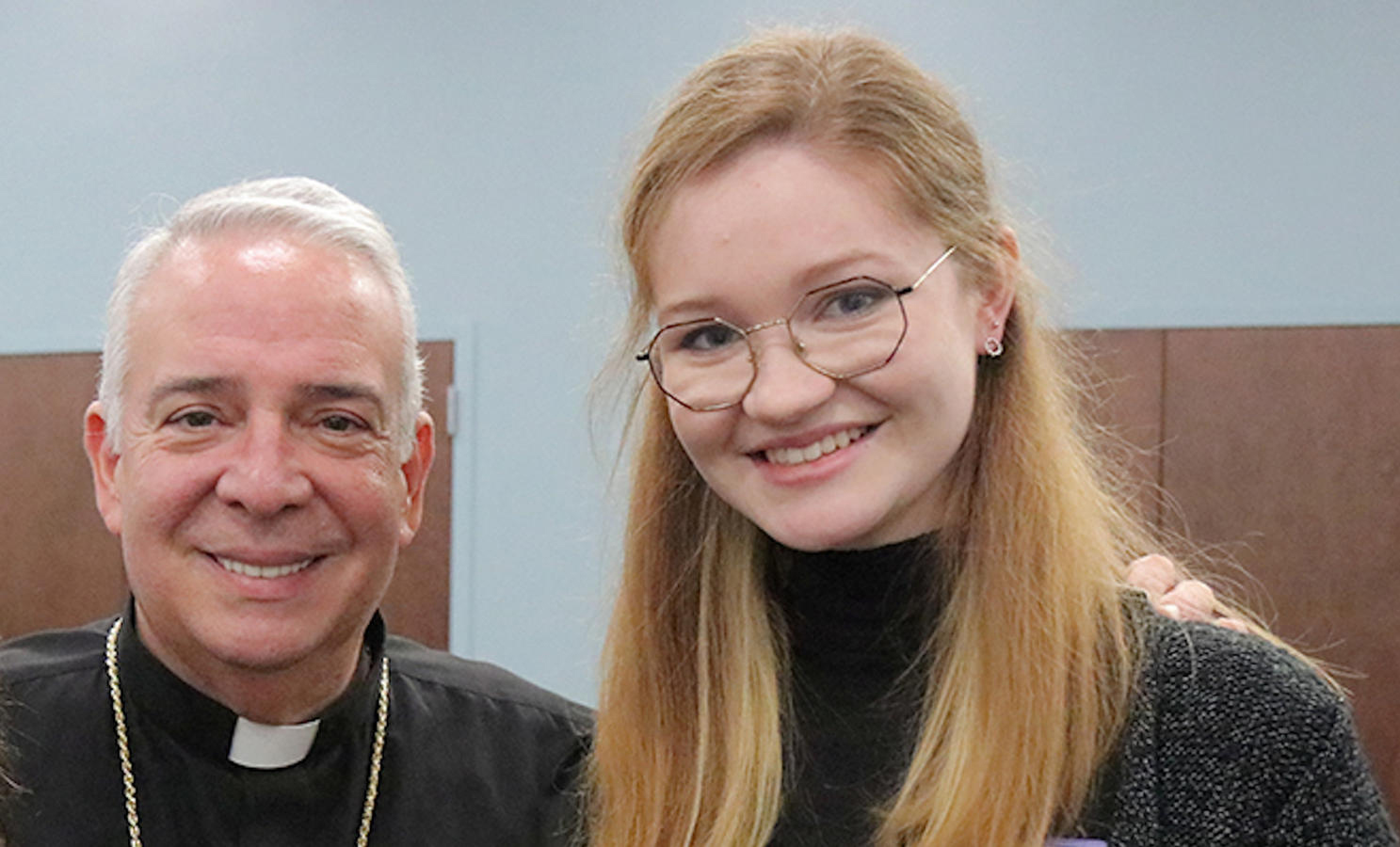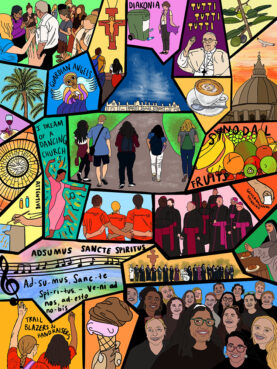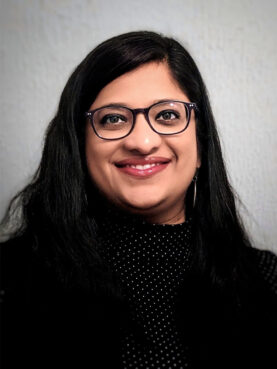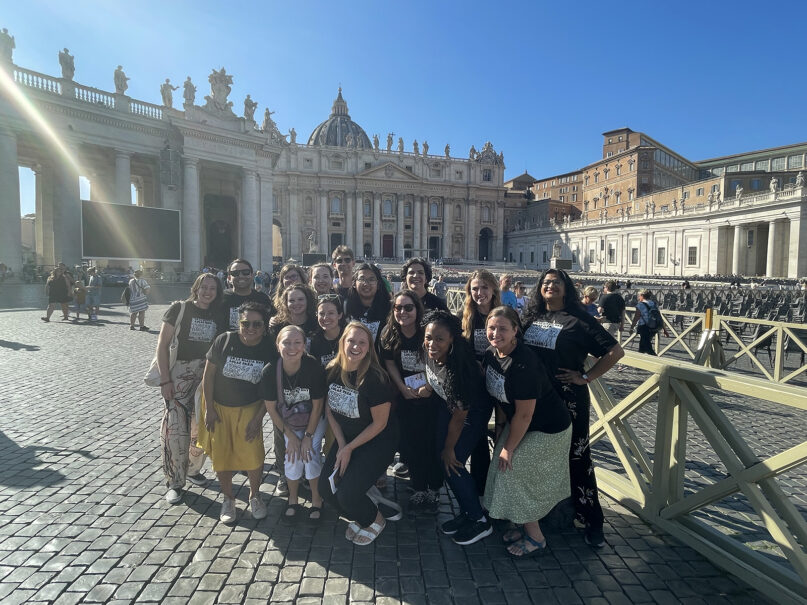(RNS) — When Julia Osęka met Pope Francis at the Synod on Synodality in October, the 22-year-old junior at St. Joseph’s University in Philadelphia asked the pontiff what had motivated him to invite young people to participate in the global meeting of the Catholic Church. Francis smiled and answered, “To make a mess,” Osęka recalled.
“I absolutely erupted in joy when he said that,” Osęka told Religion News Service. “We tried our best in the synod, and though chaos may emerge in the process and it may be hard, we have to trust that the Holy Spirit is leading us toward a new harmony.”
Osęka, one of 10 voting members from the United States and Canada of the synod who were not bishops, was also one of the youngest synod delegates and one of just 54 women. A physics major originally from Poland, she had been working in St. Joseph’s campus ministry in 2021 when Francis called the synod. She emerged as a student leader, representing her school in a coalition of Catholic colleges in the Philadelphia Archdiocese that drafted student voices into the synodal process.
In 48 listening sessions held by the coalition’s 14 colleges and other Catholic campus organizations, students expressed their visions, in words but also in artwork, for how the Catholic Church could be better connected with their lives.

Philadelphia Archbishop Nelson Pérez, left, and Julia Osęka at SCHEAP discernment gathering at Neumann University on Jan. 24, 2023. (Photo by Sarah Webb/Archdiocese of Philadelphia)
Known as SCHEAP, for Synodality in Catholic Higher Education in the Archdiocese of Philadelphia, the coalition “used the synodal model of creating spaces, of active listening and really inviting people to be protagonists in the processes of discernment, listening to what the community really desires and needs,” Osęka said.
“A lot of people have been leaving the church because they feel like they cannot fit the expectations, they feel out of place. That’s why this is incredible, because the church has said it wants to hear from you, from young people, LGBTQ people, women,” said Melanie Guckin, a junior at La Salle University and a leader at SCHEAP’s listening sessions.

“Glimpses of God” by Synod animator Becky McIntyre. (Image courtesy of Becky McIntyre)
Traditionally a gathering of bishops called to decide issues of doctrine, administration or application, the church synod has been more broadly understood under Francis as a way to include the ideas of all the baptized. In the first year of the Synod on Synodality, those ideas were gathered from local events like SCHEAP’s from around the world. These were shared with each nation’s national conference of bishops, then with continental assemblies, before being submitted in a report synthesizing the perspectives.
“What was really exciting was that some of the lines from the Vatican’s synthesis document were verbatim to what came out of our meeting in Philadelphia. That is such a great testament that our voices are being heard,” Guckin said.
Since SCHEAP’s representative Osęka and other global lay and ordained delegates have returned from the monthlong meeting, local and diocesan organizers are looking to continue the work, preparing for the synod’s next meeting, in October of 2024. The synod’s documents hold out a “preferential option for the youth,” noted Beth Ford McNamee, associate director in St. Joseph’s Office of Campus Ministry who coordinated synodal listening sessions with young adults in 2022 and 2023. “So we’re envisioning more students being trained as facilitators, and students gathering and listening sessions, continuing our work of discernment.”
SCHEAP plans to devote this year’s meetings to conversation, prayer and collective discernment, with Osęka and other student leaders playing an active role. Osęka will bring the resulting ideas back to the October 2024 synod gathering in Rome, where she will once again have a voting role.
JoAnn Melina Lopez, an alumna of St. Joseph’s who is now a lay minister in the Archdiocese of Toronto, was a facilitator at local-level synod listening sessions in the U.S., then attended a young adult pre-synod pilgrimage in Rome this summer. The weeklong pilgrimage had the purpose of praying for delegates and joining opening events. By the time the synod opened, she said, she was filled with hope for the process.
“In Rome, we felt this sense of coming together as one body, even across our differences, and that our call is to pray together, but also to really listen deeply and trust that the Holy Spirit is at work among us,” she said.

JoAnn Melina Lopez. (Photo via LinkedIn)
That body included more than just Catholics. On the eve of the synod’s first day, Pope Francis presided at an ecumenical Taize prayer vigil in St. Peter’s Square, where synod participants sat with members of Protestant and Eastern Orthodox churches as well as Eastern Rite churches in communion with Rome. “One of the quotes I heard during the pilgrimage,” Lopez said, “is that our discernment will never be fully complete as Catholics unless we’re listening to all the Christians of the world, because all of the baptized are part of the faithful.”
In his homily at the prayer service, Francis introduced the concept of silence as a synodal tool. “God does not like declarations and shouting, gossiping and noise,” the pope said. “Rather, he prefers to speak in the still, small voice,” referring to the silence of Christ’s Nativity and on the night of his Passion, and the examplars of Mary, Elijah and Abraham.
As a practical and spiritual matter, silence was built into the discussions at the synod. Each participant got a designated amount of time to speak, during which interruption was prohibited. This sent a message that all voices are valued, Lopez said.
That structure was designed to allow for empathetic and constructive dialogue amid divides in the church over some of the topics on the agenda, which included controversies such as welcoming LGBTQ Catholics and the role of women in the church, as well as the environment, immigration and global poverty.
“The process of the synodal conversation in the Spirit is egalitarian,” said Maureen O’Connell, professor of religion and theology at La Salle, “where everybody has an equal amount of time to speak without interruption and people are invited into moments of silence to receive what others have shared. We name what the conflicts and tensions are, not sidestep them.”
That sense of attentiveness to one’s neighbor, said Osęka, will drive her discernment as she looks forward to the next meeting of the synod. “I’ve leaned into my practice of the Ignatian spiritual approach of holy indifference,” she told RNS. “In the process of discernment, St. Ignatius calls us to make ourselves spiritually indifferent — not to prefer healthiness over sickness, not to prefer riches over poverty, and so on.
“That’s all that I pray for,” she added. “I think as young people, that if we rid ourselves of some presuppositions and biases when it comes to encountering another person, that opens up the space of surprise, that is a space of grace. That’s what synodality is about.”





